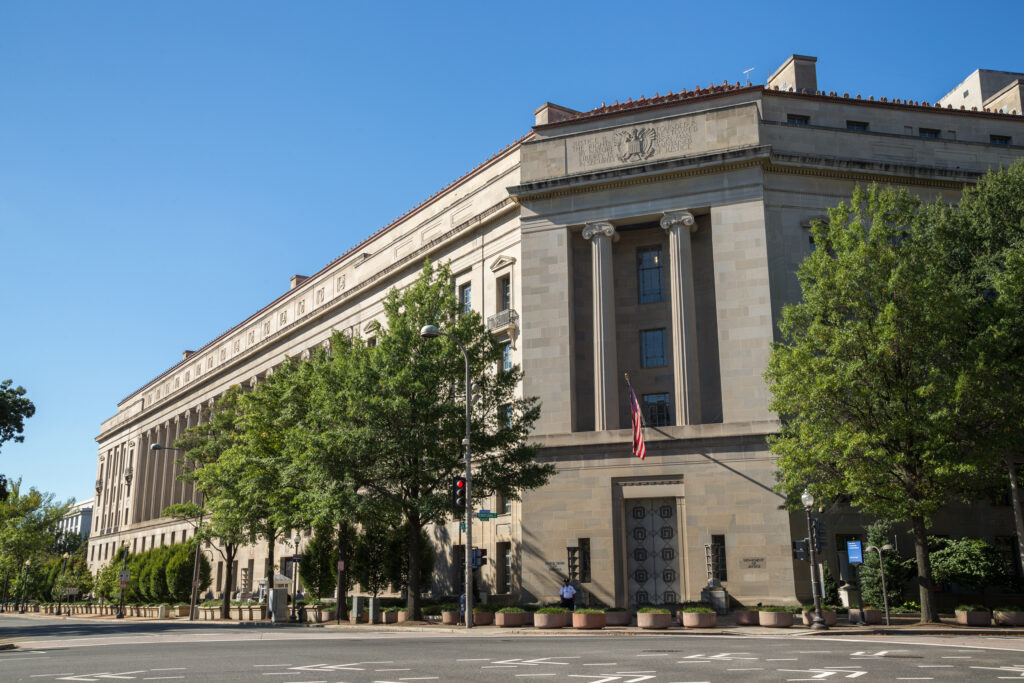DOJ Declares Support for Voters Challenging New Hampshire Robocall Intimidation Scheme

The U.S. Department of Justice (DOJ) submitted a statement in support of New Hampshire voters who allege that thousands of AI-generated robocalls distributed ahead of the state’s 2024 presidential primary intimidated Democratic voters in violation of the Voting Rights Act (VRA).
The statement comes as part of a federal lawsuit filed in March claiming political operative Steve Kramer and three telecom companies sent thousands of robocalls simulating the voice of President Joe Biden that urged likely Democratic voters to sit out New Hampshire’s Jan. 23 presidential primary.
The civil suit characterized the defendants’ alleged misconduct as an AI-generated “mass voter suppression” scheme that violates Section 11(b) of the VRA — a provision that protects voters from intimidation, threats and coercion.
In yesterday’s statement, attorneys for the DOJ’s Voting Section countered an argument made by one of the defendants that only the U.S. attorney general, but not private citizens, can bring lawsuits under Section 11(b). “The structure and history of VRA show that Congress manifested an intent for a private right of action under Section 11(b),” the statement reads.
The department further outlined how the court should assess whether the robocalls at issue in the case violated Section 11(b) — namely if they intimidated, threatened or coerced voters or attempted to do so.
According to the lawsuit led by the League of Women Voters of New Hampshire, the robocalls sought to intimidate and deter likely Democratic voters from participating in the primary by “falsely and maliciously” stating that doing so would “only enable the Republicans in their quest to elect Donald Trump again.”
At least some of the calls “spoofed” a personal phone number “associated with a prominent former state Democratic Party leader known to be a supporter of President Biden.”
“Voter intimidation, whether carried out in person or by way of robocalls, disinformation campaigns, or other tactics, can stand as a significant barrier for voters seeking to exercise their voice in our democracy,” said Assistant U.S. Attorney General Kristen Clarke of the DOJ’s Civil Rights Division in a press release yesterday.
A federal judge will hold a hearing on Wednesday, July 31 to decide whether to issue a preliminary injunction against the defendants that would prevent them from engaging in future AI-generated robocall schemes. In addition to asserting a violation of the VRA, the lawsuit brings claims under state law and the federal Telephone Consumer Protection Act.
Original post, March 14
A group of individual New Hampshire voters and the League of Women Voters filed a federal lawsuit today alleging that a scheme involving thousands of AI-generated robocalls sought to suppress Democratic voter participation in New Hampshire’s 2024 presidential primary.
According to the lawsuit, the defendants — political operative Steve Kramer and two telecom companies — sent thousands of robocalls simulating the voice of President Joe Biden that urged recipients not to vote in New Hampshire’s Jan. 23, 2024 presidential primary. The robocalls, which the lawsuit says were executed just two days prior to the primary and at a very low cost, told voters to “save” their vote for the general election.
The complaint states that the robocalls specifically attempted to intimidate and deter likely Democratic voters from participating in the primary by “falsely and maliciously” stating that doing so would “only enable[] the Republicans in their quest to elect Donald Trump again.”
The lawsuit also claims that at least some of the robocalls “spoofed” a personal phone number “associated with a prominent former state Democratic Party leader known to be a supporter of President Biden.”
“If Defendants’ deceptive and coercive tactics are not immediately declared unlawful, enjoined, and punished, citizens’ ability to exercise their right to vote free and unimpaired—the linchpin of all other civil and political rights—will be imperiled,” the lawsuit reads.
The new civil suit asserts that the defendants’ AI-generated, “mass voter suppression” scheme must be declared unlawful under Section 11(b) of the Voting Rights — which protects voters from intimidation — as well as the Telephone Consumer Protection Act and New Hampshire state law. In addition to requesting that a federal court declare the defendants’ conduct “unlawful for the sake of protecting the long-term health of American democracy,” the plaintiffs seek monetary damages.
Meanwhile, a criminal probe into the robocalls announced by the New Hampshire attorney general’s office in early February remains ongoing. At the end of February, Kramer — who admitted to orchestrating the robocall scheme and has engaged in past election-related misconduct — said he wanted to “wake up” the country about the potential for AI to influence elections.
Today’s lawsuit concluded that if the defendants are not permanently prohibited from “deploying AI-generated robocalls, there is a strong likelihood that it will happen again.”